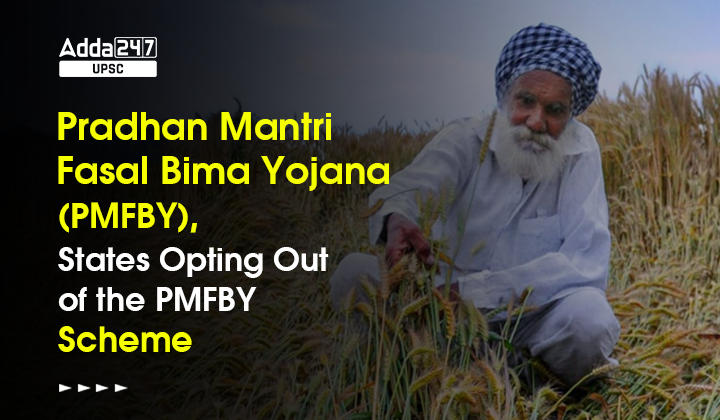Table of Contents
PM Fasal Bima Yojana (PMFBY): It is a centrally sponsored scheme for providing insurance coverage to farmers in participating states/UTs in the scheme. PM Fasal Bima Yojana (PMFBY) scheme is also important for UPSC Prelims 2023 and UPSC Mains Exam (GS Paper 2- Various government schemes and initiatives for promotion and development of various sectors in the country).
PM Fasal Bima Yojana (PMFBY) in News
Recently, detailed information about PM Fasal Bima Yojna (PMFBY) was provided by the Union Minister of Agriculture and Farmers Welfare, Shri Narendra Singh Tomar in a written reply in Lok Sabha.
Participation of States/UTs in PMFBY Scheme
The minister informed that Some States/UTs like Bihar, Telangana, Andhra Pradesh Jharkhand, West Bengal and Gujarat have opted out of the PM Fasal Bima Yojna scheme after implementing it for some seasons.
- The opted out of the Fasal Bima Yojna due to their own reasons like perception about risk and financial constraints.
- Andhra Pradesh has re-joined the scheme from Kharif 2022 season and Punjab has made a budget announcement to do the same due to the efforts of Ministry of Agriculture & Farmers Welfare.
Nature of the PM Fasal Bima Yojna (PMFBY)
All States/UTs can opt for the Pradhan Mantri Fasal Bima Yojana (PMFBY). The PM Fasal Bima Yojana (PMFBY) is voluntary in nature for all the participating States/Union Territories (UTs).
- Based on their view about risk perception and financial considerations etc., States/UTs are free to subscribe under the Pradhan Mantri Fasal Bima Yojana scheme.
- The Pradhan Mantri Fasal Bima Yojana (PMFBY) scheme is also voluntary for the farmers as well. They can enroll themselves under as per their risk perception.
Pradhan Mantri Fasal Bima Yojana (PMFBY) Implementation
The PM Fasal Bima Yojana (PMFBY) Scheme was introduced in the India from Kharif 2016 season. Till now, 27 States/Union Territories have implemented the PM Fasal Bima Yojana (PMFBY) Scheme in one or more seasons. The coverage under the PMFBY scheme (in states/UTs implementing it) has been around 30% of Gross Cropped Area (GCA) since the beginning of the scheme in 2016-17. Year-wise details of PMFBY coverage in terms of farmer applications enrolled and area insured during last three years is given below-
| Sr. No. | Year | Farmer Applications
(In Lakhs) |
Area Insured (in lakh ha.) |
| 1. | 2019-2020 | 616.16 | 508.4 |
| 2. | 2020-2021 | 623.19 | 495.4 |
| 3. | 2021-2022 | 831.76 | 459.0 |
PM Fasal Bima Yojna (PMFBY) Details
PMFBY is a centrally sponsored scheme to provide insurance coverage and financial support to the farmers in the event of failure of any of the notified crop as a result of natural calamities, pests & diseases.
- Background: PMFBY was launched in 2016 by replacing two schemes namely, National Agricultural Insurance Scheme (NAIS) as well as the Modified NAIS.
- PMFBY Premium: The PM Fasal Bima Yojna scheme has a uniform premium of only 2% to be paid by farmers for all Kharif crops and 5% for all Rabi crops.
- In case of annual commercial and horticultural crops, the premium to be paid by farmers will be only 5%.
- The balance premium is equally divided between Centre and the state.
- There is no upper limit on Government subsidy. Even if balance premium is 90%, it will be borne by the Government.
- Dispute Resolution: To resolve the technical disputes between insurance companies and other stakeholders including States, following committees have been set-
- At Centre Level: Technical Advisory Committee (TAC) at Centre level and
- At State Level: State Technical Advisory Committees (STAC) at State level
PM Fasal Bima Yojna (PMFBY) Coverage
The PMFBY envisages coverage of all food crops (cereals, millets and pulses), oilseeds and commercial/horticultural crops.
- This is subject to availability of past yield data of requisite number of years based on Crop Cutting Experiments (CCEs) as well as capacity of the State Government to conduct requisite number of CCEs to assess the yield of the crop to calculate claims.
- However, specific crop is notified by the concerned State Government keeping in view the aforesaid provision.
- For the crops not meeting the aforesaid conditions, the concerned State Government is free to notify them for coverage under Restructured Weather Based Crop Insurance Scheme (RWBCIS).
- Under RWBCIS, claims payment are being structured on the basis of weather index parameters.
PM Fasal Bima Yojana (PMFBY) FAQs
1. When was the PMFBY Scheme launched?
Ans. PMFBY was launched in 2016 by replacing two schemes namely, National Agricultural Insurance Scheme (NAIS) as well as the Modified NAIS.
2. Is joining in PM Fasal Bima Yojana (PMFBY) scheme mandatory for all states/UTs?
Ans. The PM Fasal Bima Yojana (PMFBY) is voluntary in nature for all the participating States/Union Territories (UTs).
3. Which states have recently re-joined under the PM Fasal Bima Yojana (PMFBY)?
Ans. Andhra Pradesh has re-joined the PM Fasal Bima Yojana (PMFBY) scheme from Kharif 2022 season and Punjab has made a budget announcement to do the same due to the efforts of Ministry of Agriculture & Farmers Welfare.
Union Budget 2023-24 on Agriculture and Farmers Welfare



 TSPSC Group 1 Question Paper 2024, Downl...
TSPSC Group 1 Question Paper 2024, Downl...
 TSPSC Group 1 Answer key 2024 Out, Downl...
TSPSC Group 1 Answer key 2024 Out, Downl...
 UPSC Prelims 2024 Question Paper, Downlo...
UPSC Prelims 2024 Question Paper, Downlo...
